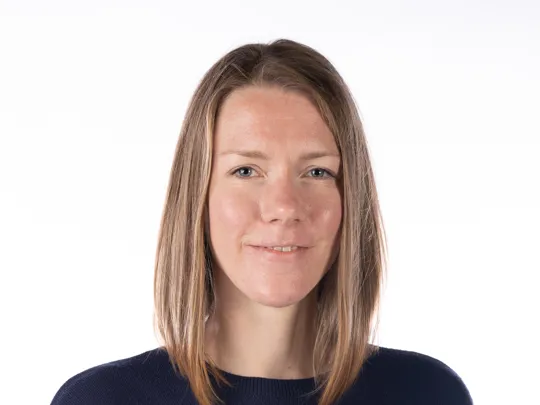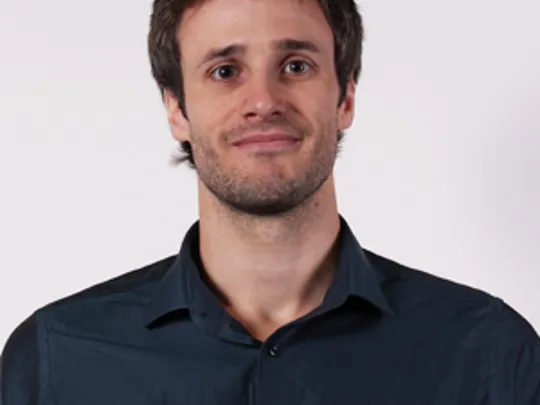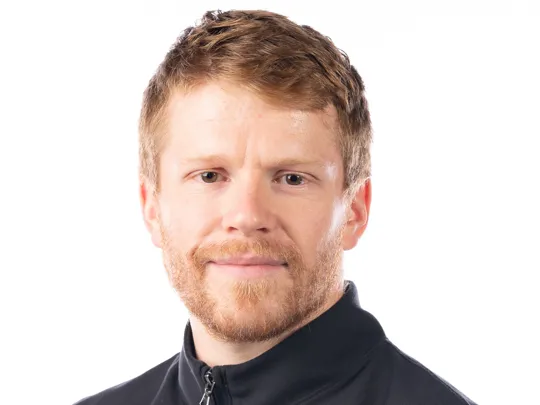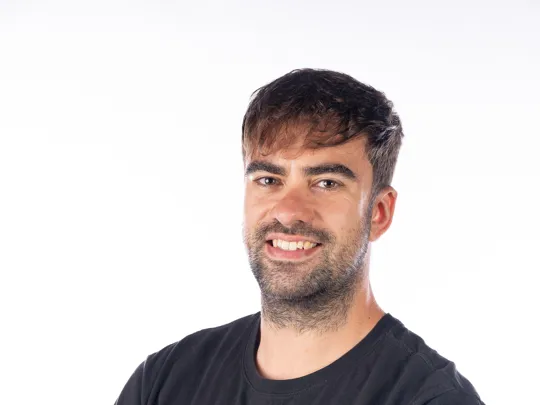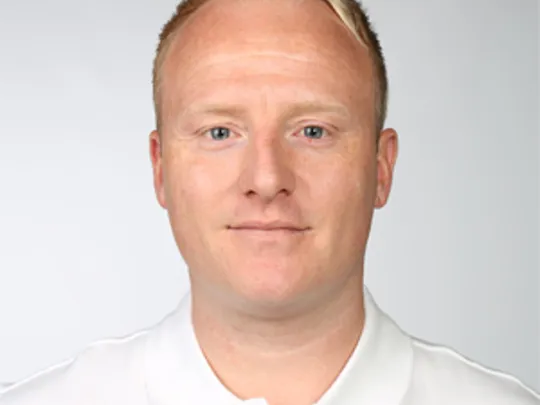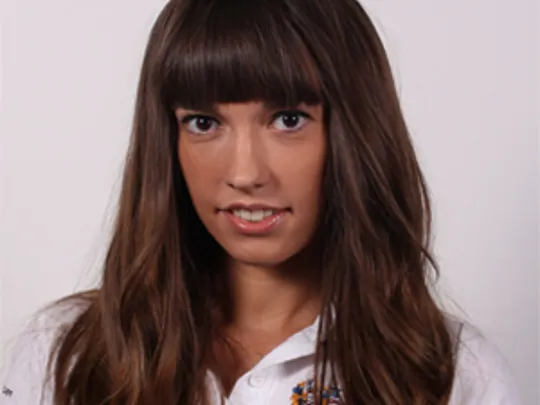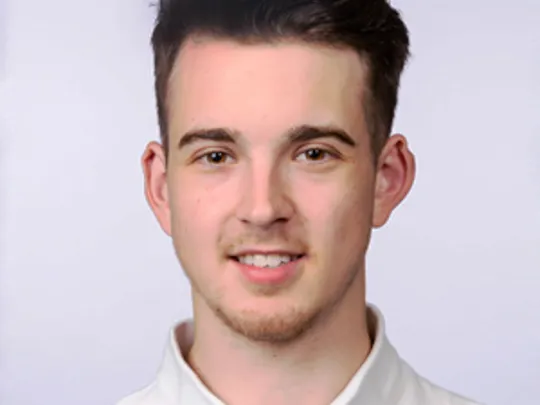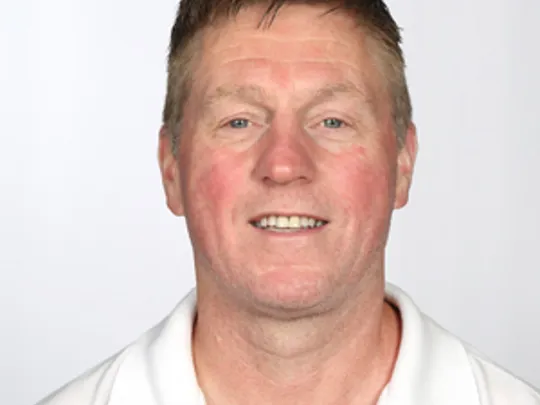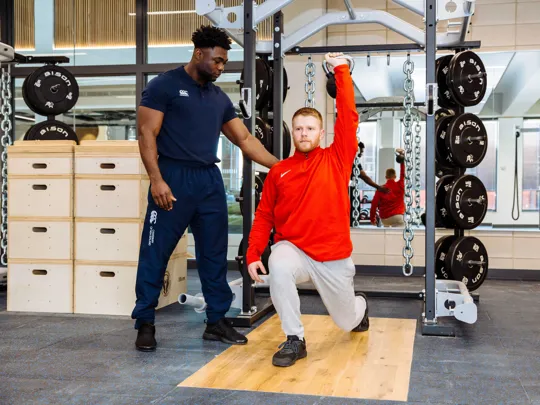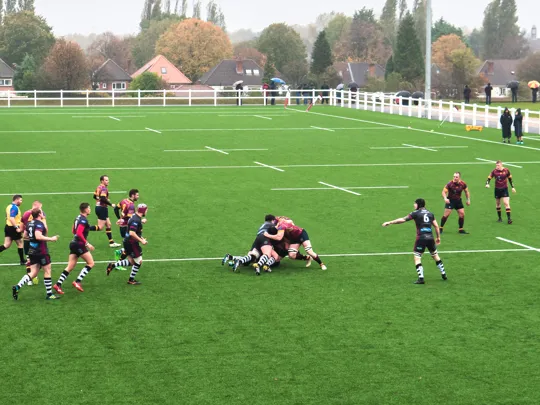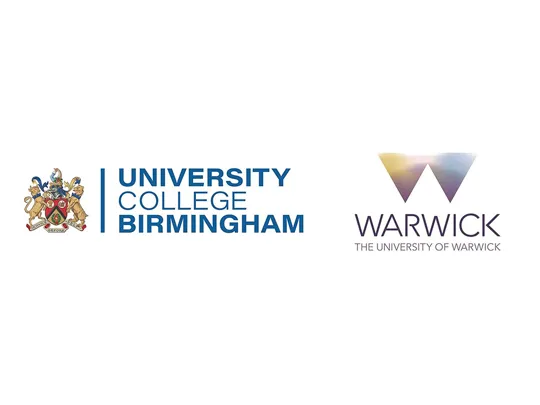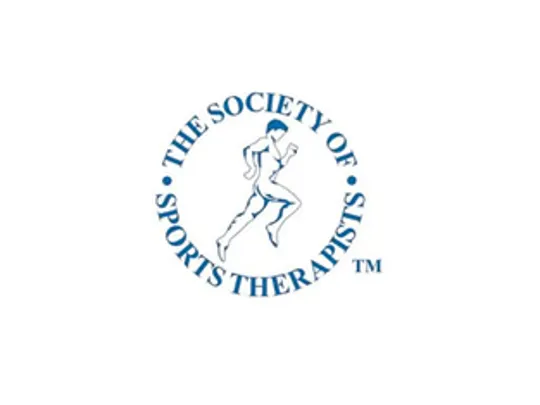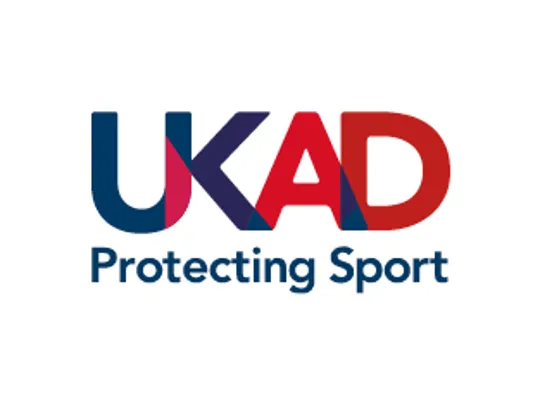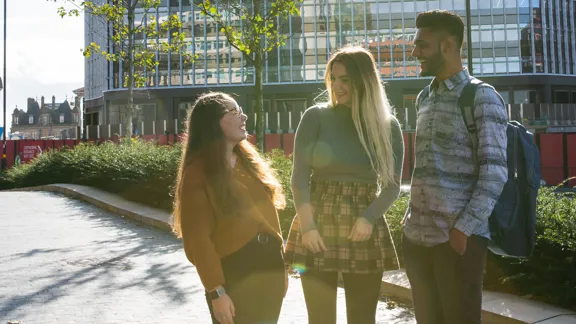of graduate employers say relevant experience is essential to getting a job with them
Why should I choose this course?
- WORK PLACEMENTS – Build invaluable professional work experience through a variety of placement opportunities during your sports therapy course – past students have worked with top-level football and rugby clubs and national sports teams
- PRACTICAL APPLICATION – Put your therapy skills into practice in our on-campus clinics and at major sporting events, such as the London Marathon and Ride Across Britain
- ENRICHMENT – Enjoy a variety of industry trips including St George’s Park and King’s College London/Wembley Stadium, as well as our annual Sports Performance and Rehabilitation Conference
- SPECIALISE YOUR STUDIES – Undertake your own research project on a subject of your choice using state-of-the-art equipment in our clinics and Human Performance Centre.
- AWARD-WINNING UNIVERSITY – Study at the highest-ranking university in the region according to student choice (Whatuni Student Choice Awards 2023)
Our facilities
Students on our sports therapy university courses have access to outstanding training facilities at University College Birmingham, with two purpose-built sports injury/massage clinics on campus where you can hone your practical skills. We also have a variety of other state-of-the-art sports facilities, including our gym, Human Performance Centre and clinics.
Course breakdown
Students on the FdSc have the option of progressing onto the final year upon completion of the foundation degree.
- Year 1
- Year 2
- Year 3
Core Modules
Exercise Instruction for Sports Therapists
The module will prepare students to work as informed and knowledgeable exercise practitioners as a sports therapist. Students will acquire the relevant skills needed to perform satisfactory and safe health screening to an individual before exercise participation. Students will gain the relevant skills needed to provide safe, effective exercise programming and prescription to a client in the context of sports therapy.
Exercise Science for Sports Therapists
Students will develop an understanding of the key sports and exercise science principles relating to sports therapy. This will include areas such as applied biomechanics, bioenergetics and exercise physiology.
Fundamentals of Movement Assessment
The module will develop learners' understanding of functional musculoskeletal anatomy and ability to perform joint movement assessment skills.
Introduction to Sports Injury Management
The module will introduce learners to the events which may result from sports injury and the treatment options available and how to safely and effectively implement them.
Musculoskeletal Anatomy
You will be introduced to basic anatomical structures of the body including bones, joints, muscles, tendons and ligaments as well as other tissues related to the musculoskeletal system. You will explore the basic functions of regional anatomy within a sporting context to understand its relevance within the industry. Anatomy is a key underpinning component of Sports Therapy practice.
Personal Development and Evidence Based Practice
This module will aim to give the learner an understanding of what attributes are needed to be a university sports therapy student. The module will also aim to facilitate the transition of learners from FE to HE via a structured delivery of academic study skills related specifically to their Sports Therapy programme.
Core Modules
Pathology of Sports Injuries
This module aims to evaluate the predisposing factors for musculoskeletal injury, coupled with the common aetiology and presenting signs and symptoms. An appreciation of processes related to injury such as soft tissue healing and pain will also be considered in relation to regional musculoskeletal complaints.
Peripheral and Spinal Assessment
This module further develops key musculoskeletal assessment & examination skills in conjunction with basic clinical reasoning to provide students with the skills required to be able to carry out more detailed musculoskeletal assessments.
Research for Sports Therapists
The process of data collection and analysis will allow you to develop research techniques specific to a sports therapist. You will critique and analyse current research and scientific methods to develop your critical thinking abilities and key research skills.
Screening and Intervention for Injury Prevention
The module aims to explore the role of the Sports Therapist in identifying and reducing injury risk. Using a data collection project, students will recognise and apply methodological approaches to identify the epidemiology (distribution and determinants) of injury. Students will appraise injury prevention methods and from an analysis of the collected data, design and implement suitable methods to reduce the risk of injury.
Sport and Exercise Rehabilitation 1
This module introduces exercise rehabilitation in the management of sports injuries. It aims to provide students with an insight into exercise management, planning and prescription in a rehabilitation context.
Sport and Exercise Rehabilitation 2
This module further develops exercise rehabilitation in the management of sports injuries. It aims to provide students with the ability to return an athlete to sport following injury and enhance sporting performance.
Core Modules
Exercise as Medicine
The module aims to promote health and wellness through the increased use of physical activity and exercise in the prevention and treatment of disease. Students will be able to provide brief interventions on physical activity advice whilst protecting and promoting the health of patients.
Multidisciplinary Practices in Sport
A common employment destination for Graduate Sports Therapists is sports teams. The focus of this module is to develop knowledge and understanding of how a Graduate Sports Therapist would operate in a sports team environment.
Professional Clinical Practice
This module will allow the development of the clinical skills required of a sports therapist via exposure of working in a supervised sports injury clinic. In support of the practical component, lectures and seminars will develop the use of evidence-based practice, clinical reasoning and personal critical analysis skills, by means of reflection and assessment of learning needs.
Sport and Nutrition Project
You are required to select a research question or topic aligned to your profession, formulate the best way to answer the question, and present your written findings in both a written and presentation format (poster presentation).
The modules listed above for this course are regularly reviewed to ensure they are up to date and informed by industry as well as the latest teaching methods. On occasion, we may need to make unexpected changes to modules – if this occurs, we will contact all offer holders as soon as possible.
Entry requirements
Sports Therapy BSc (Hons)
A-levels: An A-level grade profile of CCC.
T-levels: A T-level graded Pass with a core component of grade C.
BTEC: A BTEC grade profile of MMM. This can be achieved from either an Extended Diploma or a combination of smaller BTEC qualifications.
Tariff: Other Level 3 qualifications are accepted for entry. A minimum of 96 UCAS Tariff points will be required.
Access to Higher Education Diploma: 96 UCAS Tariff points including a minimum of 15 Level 3 credits at Distinction.
You must also complete a Disclosure and Barring Service (DBS) check. University College Birmingham will co-ordinate and fund the completion of the DBS check.
It is desirable but not essential to hold a science qualification at level 3 or a strong science GCSE grade. Most importantly, we are looking for enthusiasm for the subject of subject of sports and exercise science/therapy, whatever your academic background.
Sports Therapy FdSc
A-levels: An A-level grade profile of CD.
T-levels: A T-level graded Pass with a core component profile less than C.
BTEC: A BTEC grade profile of PPP. This can be achieved from either an Extended Diploma or a combination of smaller BTEC qualifications.
Tariff: Other Level 3 qualifications are accepted for entry. A minimum of 48 UCAS Tariff points will be required.
Access to Higher Education Diploma: 48 UCAS Tariff points.
Non-tariff: Non-UCAS Tariff-based Level 3 qualifications are also considered for entry. Please complete our enquiry form here to check your eligibility.
Work-based: We also give equal consideration to applicants who are currently in work and wish to apply to University College Birmingham. To apply, you must have a minimum of 3 years’ relevant work experience, demonstrating management or supervisory duties. Your application must also include a reference from your line manager supporting your entry to higher education. For further details, please contact Admissions.
You must also complete a Disclosure and Barring Service (DBS) check. University College Birmingham will co-ordinate and fund the completion of the DBS check.
It is desirable but not essential to hold a science qualification at level 3 or a strong science GCSE grade. Most importantly, we are looking for enthusiasm for the subject of sports and exercise science/therapy, whatever your academic background.
International students
For academic and English entry requirements for EU and international students, please visit the Country Specific Information page.
Please note: As an International Student, when choosing optional placement, a visa extension may be required.
Key information
Teaching and assessment
Note: Indicative information only – actual timetables and assessment regimes will be issued at your induction.
Teaching
Example of a typical teaching week (up to 15 contact hours):
- Large group teaching – 3 hours
- Smaller group teaching – 9 hours
- Tutorials – 3 hours
- Field trips and sports events
- Work experience
You will also need to commit around 20 hours per week for individual study time.
Assessment
Estimated breakdown of assessment for this degree course:
- Coursework – 40%
- Practical assessment – 44%
- Written examinations – 16%
Our teaching and assessment is underpinned by our Teaching, Learning and Assessment Strategy 2021-2024.
Additional qualifications and training
Alongside your degree, you will get the opportunity to complete other courses such as the Lubas FASE 1 and FASE 2 first aid courses (included in the degree cost), as well as the ITEC Level 4 massage course which is heavily subsidised at approximately £300.
Uniform and kit costs
This course incurs additional costs of approximately £100 for uniform and kit. (Prices are subject to change each year – exact costs and information on how to order required items will be provided to you prior to enrolment.)
Tuition fees
UK students
If you are a UK student enrolling on a standard-length Foundation Degree or a BA/BSc at University College Birmingham, your 2024/25 academic year fee will be £9,250. A half-year tuition fee is £4,625.
View undergraduate fees
International students
If you are an international student enrolling on a full-time Foundation Degree or a BA/BSc in 2024/25, your fee for this academic year will be £14,000 per year. If you complete a placement year, there will be an administration fee of £500 for a full year or £250 for a half-year placement.
Scholarships and bursaries
Sporting Excellence Scholarship
Students on our sports courses at University College Birmingham may be eligible to receive one of our Sporting Excellence Scholarships. These are open to applicants from any country who are able to demonstrate ongoing excellence in sporting achievement.
Two levels of support package are available, with awards of up to £3,000 towards competitions, training costs and equipment over three years of study. The scholarship also includes:
- University-branded training kit
- Free gym membership
- Individually tailored programme - may include nutrition, sports psychology, strength and conditioning or lifestyle support
- Weekly sports therapy/massage
To find out more about the levels of support and eligibility criteria, visit our scholarships and waivers page.
Kick-Start Scheme
As a new student studying this course full-time, you will receive £300 per year through our Kick-Start Scheme (UK students only, eligibility criteria applies). This scheme will support your studies and future career by contributing to course-related materials, uniform or selected items on campus. You may also qualify for an additional £500 per year.
Find out more about the Kick-Start Scheme here.
Unibuddy Community - meet other students on your course
Starting university is an exciting time, but we understand that it can sometimes feel a little daunting. To support you, you will be invited to join our Unibuddy Community, where you can meet other students who have applied for the same course at University College Birmingham, before you start studying here.
As soon as you have been made an offer, you will be sent an invitation email to complete your registration and join the Unibuddy Community. For more information, check out our Unibuddy Community page.
Latest updates
Join the conversation and check out the latest updates from the department of Sport and Nutrition.
| UCB Sports |
Accreditations, endorsements and partnerships
University College Birmingham works with a wide range of organisations to ensure you receive the best possible training and qualifications recognised by industry.
Work placements
Work placements are vital for gaining real-life experience and for building your confidence and skills before you finish your course – and they may even lead to a job when you graduate. Our Hired team can help find the ideal placement for you.
Placements are a requirement of The Society of Sports Therapists, so we encourage students on our FdSc and BSc Sports Therapy courses to gain work experience throughout your studies, working on placement with professional sports therapists.
Work alongside experts in your sector
A snapshot of some of the employers we have worked with:
- Scotland Rugby team
- Team Scotland (Commonwealth Games)
- Aston Villa FC
- Leicester Tigers RFC
- West Bromwich Albion Ladies FC
- West Midlands Fire Service
- Royal Papworth Hospital, Cambridge (physiotherapy department)
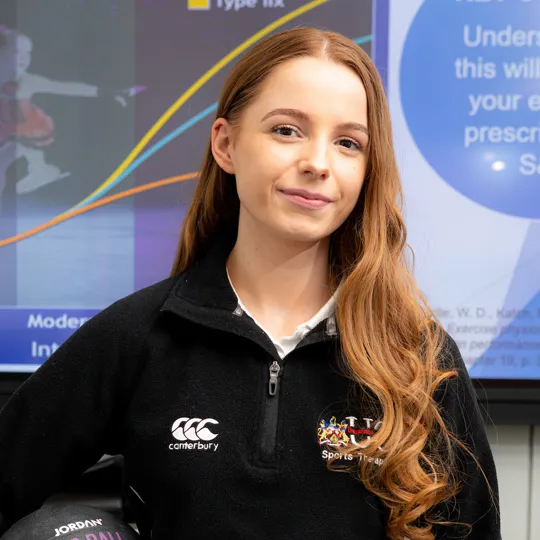
I’ve wanted a career in sport for as long as I can remember. And, wow, what an unimaginable start. I’ve had the incredible opportunity to work alongside Scotland Rugby, especially during the World Cup in Japan, and I was very excited to get stuck in and help the team.
Career opportunities
Note: Some roles below may require further study/training. The roles and salaries below are intended as a guide only.
Sports physiotherapist
Average salary: £23,000 – £45,000
Occupational therapist
Average salary: £24,907 – £62,001
Sports therapist
Average salary: £17,000 – £37,000
Health promotion specialist
Average salary: £24,907 – £44,503
Personal trainer
Average salary: £14,000 – £35,000+
Higher education lecturer
Average salary: £35,211 – £43,367
Want to take your studies to the next level? Completing the BSc (Hons) degree will enable you to move onto our postgraduate courses such as Strength, Conditioning and Performance MSc or Enterprise Management MSc/PGDip.

Kenny’s Story
Kenny not only got to support the Scotland rugby team at the 2019 World Cup, but now works for a Championship rugby side.
What our students on this course say...
100%
of students on this course say that teaching staff are good at explaining things
100%
of students say this course develops knowledge and skills they think they will need in their future
90%
of students at the University say their course is intellectually stimulating
*National Student Survey (NSS) 2023
**Course statistics relate to the BSc (Hons) degree
Course statistics
BSc (Hons)
FdSc
Meet your lecturers
